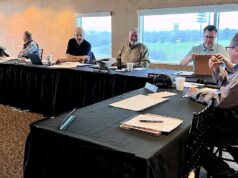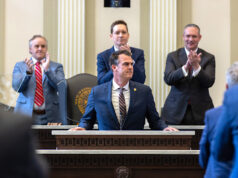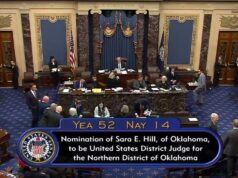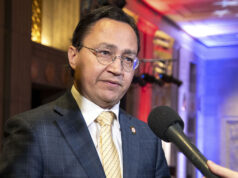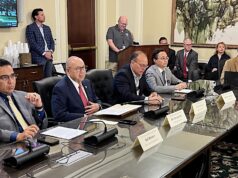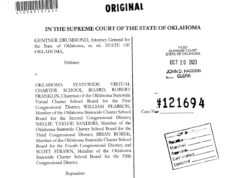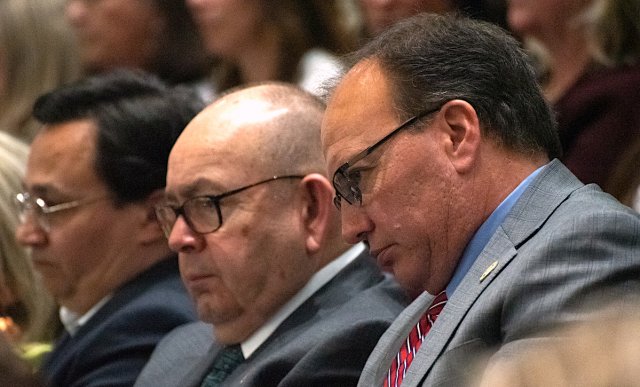

If you spend enough time listening to Oklahoma Gov. Kevin Stitt and the leaders of three tribal nations that sued him New Year’s Eve over the Model Tribal Gaming Compact, both parties often repeat some version of the same statement: We offered to sit down and work this out.
In reality, a 2018 ruling from the U.S. 10th Circuit Court of Appeals functionally hamstrung the two sides’ ability to resolve their dispute — about whether the gambling compact automatically renews — through arbitration. In Citizen Potawatomi Nation v. State of Oklahoma, appellate court judges severed the entire arbitration clause from the Model Tribal Gaming Compact approved by Oklahoma voters in 2004.
An employment and civil litigation attorney, Rep. Terry O’Donnell (R-Catoosa) has watched the disagreement between Stitt and tribal leaders unfold from afar. He agreed to comment Tuesday about how the situation would have unfolded differently had the compact’s arbitration clause not been invalidated exactly two years ago today.
“The parties could have resorted to arbitration. This dispute could have been resolved short of judicial action,” O’Donnell said. “In my mind, that would have really accelerated this, and we could have kind of had whatever friction there is disposed of, and we could have moved forward.”
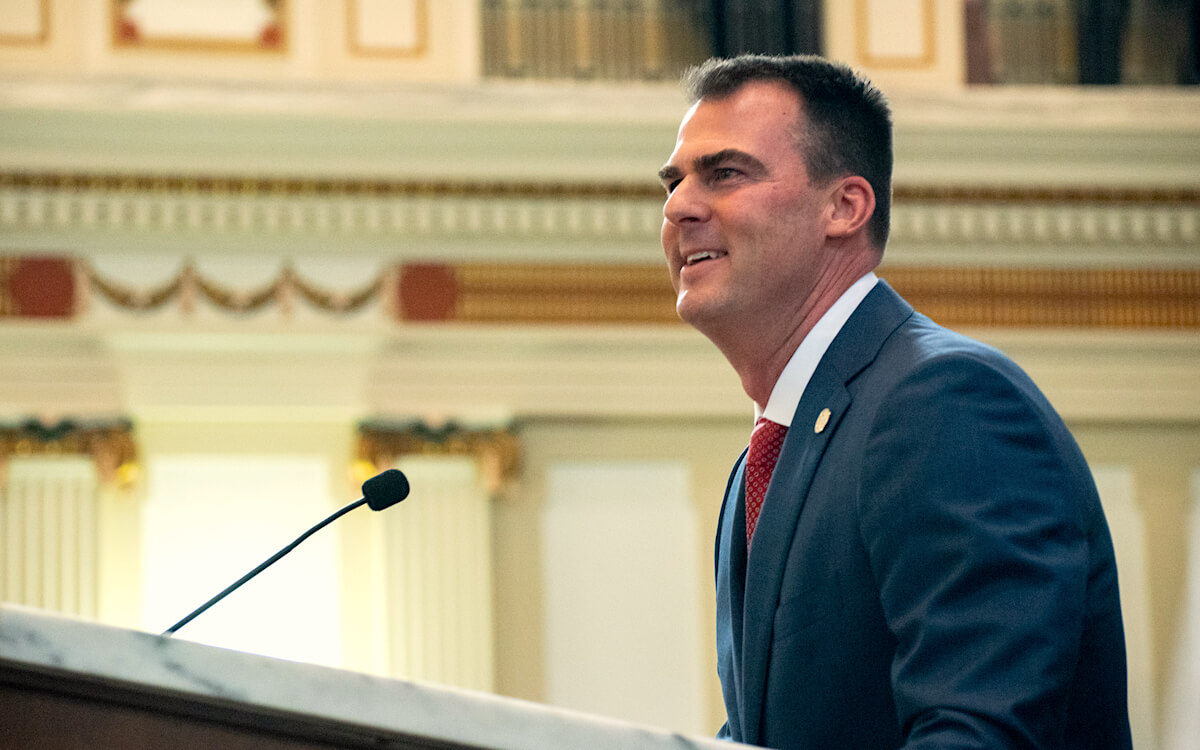
‘Resolve all disputes amicably and voluntarily whenever possible’
When agreed to by state leaders, tribal leaders and Oklahoma voters, part 12 of the Oklahoma Model Tribal Gaming Compact was labeled “Dispute Resolution” and spelled out three procedures. The first of which read:
The goal of the parties shall be to resolve all disputes amicably and voluntarily whenever possible. A party asserting noncompliance or seeking an interpretation of this Compact first shall serve written notice on the other party. The notice shall identify the specific Compact provision alleged to have been violated or in dispute and shall specify in detail the asserting partys (sic) contention and any factual basis for the claim. Representatives of the tribe and state shall meet within thirty (30) days of receipt of notice in an effort to resolve the dispute.
The second procedure formed the grounds and rules for arbitration:
(…) The remedies available through arbitration are limited to enforcement of the provisions of this Compact. The parties consent to the jurisdiction of such arbitration forum and court for such limited purposes and no other, and each waives immunity with respect thereto. One arbitrator shall be chosen by the parties from a list of qualified arbitrators to be provided by the [American Arbitration Association]. If the parties cannot agree on an arbitrator, then the arbitrator shall be named by the AAA. The expenses of arbitration shall be borne equally by the parties. (…)
The third procedure established that, after arbitration, the parties could still take their dispute to court for de novo review — from the beginning and without consideration of the arbitration finding — if desired:
Notwithstanding any provision of law, either party to the Compact may bring an action against the other in a federal district court for the de novo review of any arbitration award under paragraph 2 of this Part. The decision of the court shall be subject to appeal.
When the Citizen Potawatomi Nation requested its 2016 arbitration, the dispute at hand had little to do with casino gambling. Instead, the 33,000-member tribe sought protection against the Oklahoma Tax Commission, which had questioned $27 million in sales tax exemptions claimed between 2001 and 2014 at CPN-owned businesses. For the first time, the Tax Commission asserted a claim to collect sales tax on sales made by tribal businesses to non-tribal customers, and the Alcoholic Beverage Law Enforcement Commission attempted to revoke the Citizen Potawatomi Nation’s alcoholic beverage permits to enforce the claim.
Under part 12 of the Model Tribal Gaming Compact’s dispute resolution provision, CPN and the state began arbitration in front of Daniel Boudreau, a retired Oklahoma Supreme Court justice. Boudreau found in favor of the tribe, which subsequently filed an enforcement action in the U.S. Western District Court of Oklahoma. The state, then, filed a motion to exercise the gaming compact’s de novo review provision, asking the federal court to consider the entire dispute. The federal district court issued an order enforcing the arbitration decision, and it ruled that Oklahoma’s motion for de novo review was neutralized by the 2008 U.S. Supreme Court decision in Hall Street Associates, LLC v. Mattel, Inc., which had established new precedent that prohibited parties to an arbitration from seeking de novo review of the legal determinations of the arbitrated award.
As a result, Oklahoma took the issue to the 10th Circuit Court of Appeals, arguing that because the 2008 U.S. Supreme Court case prevented the de novo review specified in the Model Tribal Gaming Compact, the entire “dispute resolution” section of the compact should be invalidated.
On Feb. 6, 2018, the appellate court ruled in favor of Oklahoma’s claim, thus vacating the specific arbitration finding in the CPN case and invalidating the entire dispute resolution provision of the gaming compact, which more than 30 tribes have signed with Oklahoma.
‘One of the more significant reasons we are in the position we are today’
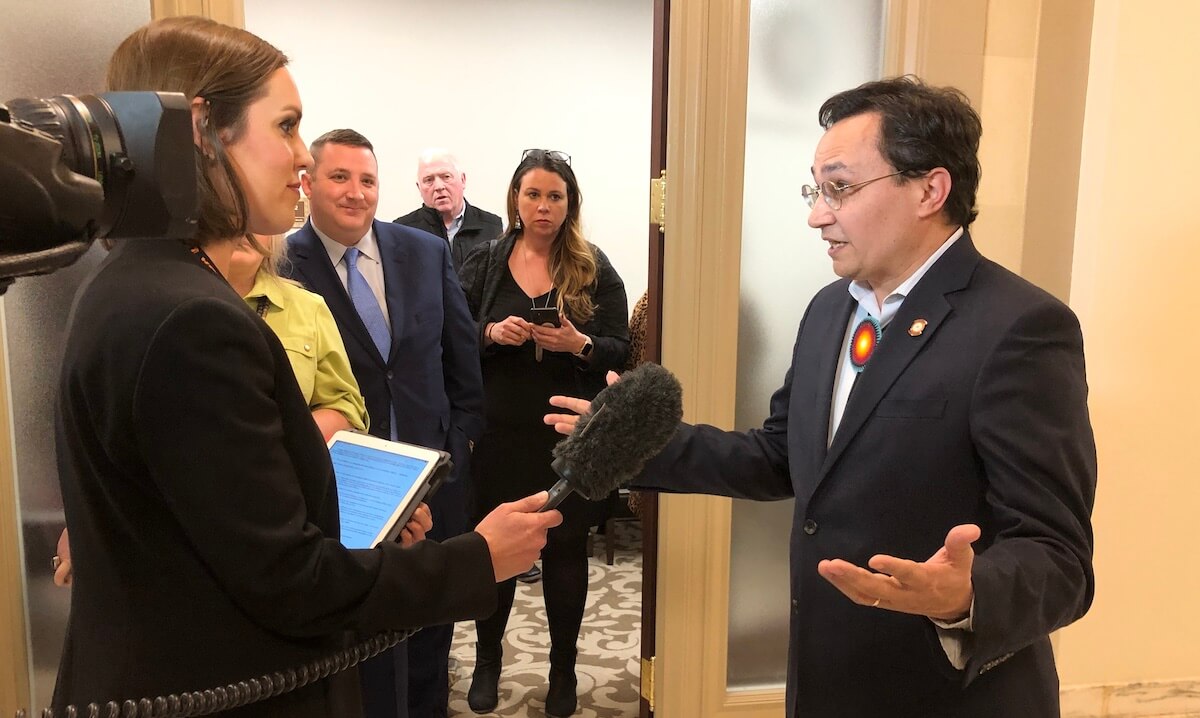
Speaking to media Monday after Stitt’s State of the State address, Cherokee Nation Principal Chief Chuck Hoskin Jr. discussed the 10th Circuit Court of Appeals’ ruling in 2018.
“Had there been a mandatory arbitration provision, we could have all triggered that long ago,” Hoskin said.
Baylee Lakey, Stitt’s communications director, called the invalidated dispute resolution language in the gaming compact “legally deficient.”
“This is one of the more significant reasons we are in the position we are today, because so much of the Model Gaming Compact is unclear and provides uncertainty,” Lakey said in a statement. “In October, the governor proposed legally binding arbitration, as reflected in other compacts, to allow the parties to resolve their differences and avoid a costly lawsuit, but the tribes rejected this proposal and the Chickasaw, Cherokee and Choctaw nations filed a federal lawsuit instead.”
Hoskin, who sat in the House gallery Monday and listened as Stitt discussed “the sovereignty of the state of Oklahoma,” said the 2018 invalidation of the arbitration provision complicated matters.
“What we’re left with is the pure good faith of the parties,” Hoskin said. “And when you have one party — the governor of the state of Oklahoma — frankly starting out from a position of disrespect to the tribes, talking to us through an op-ed, calling us illegal — as his phony deadline was not really bought by anybody — (…) that all made it difficult in a good faith manner to sit down. It takes two to get these things done. We’ve been willing to do it, but the governor frankly has been more interested in rhetoric.”
Asked his reaction to Stitt not mentioning tribal sovereignty during Monday’s address, Hoskin replied quickly.
“One would think he would given that he is a citizen of the sovereign Cherokee Nation,” Hoskin said.
‘Not a reasonable opportunity’ to create new arbitration agreement
Stephen Greetham, general counsel for the Chickasaw Nation, discussed the invalidated arbitration clause during a January press conference outside the State Capitol.
“Once the 10th Circuit (Court of Appeals) knocked that arbitration provision out, there were no more individual tribal waivers of immunity for an arbitration process, and the rules by which the arbitration would take place would have to be negotiated and worked out,” Greetham said. “That’s one thing that [members of the Stitt administration] kind of skate past. When he references that the state proposed arbitration, yes, that was not an unreasonable suggestion to make, but given that the proposal came at the end of October and we were being pushed up against this manufactured crisis of a Dec. 31 deadline, there simply was not a reasonable opportunity to put the whole package together to get there.”
Greetham said tribal representatives “had conversations with Attorney General (Mike) Hunter a year ago” on the subject and that, moving forward, the problem of not having an arbitration provision in the gaming compact could be fixed “relatively easily.”
“We’ve all been able to figure out a way into the courtroom,” Greetham said. “So it’s not that we don’t have a means for recourse, it’s just not what we originally negotiated. If we would prefer to restore those (arbitration) provisions, we can do that easily without this thermonuclear path that Gov. Stitt has chosen to take us all down.”
With the tribes’ lawsuit filed and the governor’s response submitted, creating new arbitration language to handle future casino gambling disputes is no one’s top priority. And as the Citizen Potawatomi Nation case showed, parties to the gaming compact could still have ended up in federal court even if arbitration had been a possibility.
“I don’t think anybody believes that resorting to judicial action is not a complicating factor. We are going to have to wait for a court’s decision,” O’Donnell said. “I know there is a lot of angst on both sides, both from the tribal nations and from the governor’s office, to get this issue resolved. I think they really do want to resolve it and that arbitration would have accelerated the process.”
(Correction: This story was updated at 7:55 a.m. Thursday, Feb. 6, to note the correct population of the Citizen Potawatomi Nation. NonDoc regrets the error.)









